One in four UK companies are suffering badly in the current corona crisis
More than 1 in 4 UK companies are being heavily impacted by the corona pandemic. That is the conclusion of the business intelligence specialist Graydon UK, based on the financial health of UK businesses and the current economic situation. It is estimated that of all companies that Graydon UK identified as healthy at the beginning of March 2020, around 30 per cent are now facing difficulties.
“The damage to business is significant, and the numbers are very concerning”, says Simon Blackwell, managing director of Graydon UK. “We aren’t used to having to publish these kinds of statistics.” More than 1 in 4 UK companies (27,2% of the total business population) are being heavily impacted. “The consequences are far reaching, especially considering how interconnected our economy is.” However, it is not all doom and gloom, there are also companies that are currently experiencing little to no impact from this crisis. “More than 70% of the business population is able to continue doing business under these circumstances although in the longer term the expectation is that these companies will also start feeling the impact.”
Data Scientists at Graydon offer insight into the financial health of companies before the current restrictions were imposed and also the scale of the impact that they are experiencing as a result of those measures. “Of course, financially robust companies can cope better with this situation, however, we are seeing that even among healthy businesses as many as 14% may face challenges”, Blackwell explains. “Even food stores that are still open and doing really well when it comes to sales, are highly impacted because of the extra costs of staffing (with overtime pay), and delivery and logistics costs”

(Air) Transport, leisure and hospitality businesses hit hard
In the list of top sectors impacted by coronavirus, it might not be a surprise to see travel, passenger transportation and leisure featuring prominently. Amongst the impacted sectors in transportation are interestingly driving schools. “Because of the public health advice regarding social distancing all instructors stopped delivering driving lessons, until at least the end of April. These businesses are not capable to continue in an alternative way. Turning to virtual methods like other tutoring sectors isn’t an option for driving lessons and tests.”

The Leisure industry is also highly impacted. “Amusement and theme parks and sports clubs are among the most impacted industries”, according to Blackwell. The closure of food and drink establishments since 20th March shows its effects in Graydon’s analysis. “85% of them are experiencing an above-average impact, so it really remains to be seen whether they will survive in the long run and if the announced support from the government is sufficient”, says Simon Blackwell. However, there are some industries where the impact of the measures, at least for the time being, is significantly smaller, such as utility companies, online retail and call centre agencies.
New calculation model for crisis periods
Graydon has developed a new descriptive scoring model that assesses the impact of the emergency measures on UK business. The Graydon Impact Score takes into account amongst other factors: sector specific risks, location, contagion areas, international trade and group ownership. In the coming period, we will look to evolve the model to react to changes in lockdown and other economic measures. Used in combination with existing scores and ratings, the Impact Score will help businesses determine the best actions to mitigate risk during this challenging period. Blackwell: “The purpose of the score is not to penalise or single out businesses that are struggling, but to help organisations identify which of their customers or suppliers are likely to need support during these uncertain times, perhaps in the form of extended payment terms, loans or a rent or payment holiday. It’s imperative that companies of all sizes support each other during this period.”

